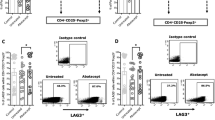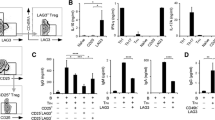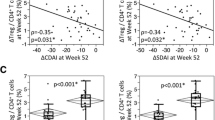Abstract
Rheumatoid arthritis (RA) is an autoimmune and inflammatory disease. Natural T regulatory (nTreg) cells, which constitutively express the CTLA-4 molecule, have an important role in the pathogenesis of autoimmune conditions. Although it has been reported that biological agents are able to modulate the levels or function of Treg lymphocytes, the possible effect of Abatacept (CTLA-4-Ig) therapy on these cells has not been studied in autoimmune conditions. We explored the effect of Abatacept therapy on Treg cells in patients with RA. The number of different subsets of Treg cells was analyzed by flow cytometry in the peripheral blood from 45 patients with RA that were (n = 30) or not (n = 15) under Abatacept therapy as well as in 20 healthy controls. The function of Treg cells was assessed by an assay of inhibition of lymphocyte proliferation. We found that Abatacept therapy was associated with a significant diminution in the levels of CD4+CD25brightFoxp3+, and CD4+CTLA-4+ nTreg cells. In contrast, the regulatory function of CD4+CD25+ lymphocytes was significantly enhanced after the administration of Abatacept. Our data suggest that CTLA-4-Ig exerts a complex and interesting effect on Treg cells in patients with RA.




Similar content being viewed by others
References
Feldmann M, Brennan FM, Maini RN. Rheumatoid arthritis. Cell. 2000;85:307–10.
Van Amelsfort J, Jacobs K, Bijlsma J, Lafeber F, Taams L. CD4+CD25+ regulatory T cells in rheumatoid arthritis. Arthritis Rheum. 2004;50:2775–85.
Alegre M, Frauwirth K, Thompson C. T-cell regulation by CD28 and CTLA-4. Nat Immunol. 2001;1:220–8.
Sharpe AH. Mechanisms of costimulation. Immunol Rev. 2009;229:5–11.
Sakaguchi S. Naturally arising Foxp3-expressing CD25+CD4+ regulatory T cells in immunological tolerance to self and non-self. Nat Immunol. 2005;6:345–52.
Vigna-Pérez M, Abud-Mendoza C, Portillo-Salazar H, Alvarado-Sánchez B, Cuevas-Orta E, Moreno-Valdés R, et al. Immune effects of therapy with Adalimumab in patients with rheumatoid arthritis. Clin Exp Immunol. 2005;141:372–80.
Dooms H, Abbas AK. Revisiting the role of IL-2 in autoimmunity. Eur J Immunol. 2010;40:1538–40.
Wright GP, Notley CA, Xue SA, Bendle GM, Holler A, Schumacher TN, et al. Adoptive therapy with redirected primary regulatory T cells results in antigen-specific suppression of arthritis. Proc Natl Acad Sci USA. 2009;106:19078–83.
Avogadri F, Yuan J, Yang A, Schaer D, Wolchok JD. Modulation of CTLA-4 and GITR for cancer immunotherapy. Curr Top Microbiol Immunol. 2010. doi:10.1007/82_2010_49.
Mellor AL, Chandler P, Baban B, Hansen AM, Marshall B, Pihkala J, et al. Specific subsets of murine dendritic cells acquire potent T cell regulatory functions following CTLA4-mediated induction of indoleamine 2,3 dioxygenase. Int Immunol. 2004;16:1391–401.
Chen W, Wahl SM. TGF-beta: the missing link in CD4+CD25+ regulatory T cell-mediated immunosuppression. Cytokine Growth Factor Rev. 2003;14:85–9.
Huss DJ, Winger RC, Peng H, Yang Y, Racke MK, Lovett-Racke AE. TGF-beta enhances effector Th1 cell activation but promotes self-regulation via IL-10. J Immunol. 2010;184:5628–36.
Walunas TL. CTLA-4 can function as a negative regulator of T cell activation. Immunity. 1994;1:405–13.
Jain N, Nguyen H, Chambers C, Kang J. Dual function of CTLA-4 in regulatory T cells and conventional T cells to prevent multiorgan autoimmunity. Proc Natl Acad Sci USA. 2010;107:1524–8.
Sakthivel P. Bench to bedside of CTLA-4: a novel immuno-therapeutic agent for inflammatory disorders. Recent Pat Inflamm Allergy Drug Discov. 2009;3:84–95.
Buch MH. Sequential use of biologic therapy in rheumatoid arthritis. Curr Opin Rheumatol. 2010;22:321–9.
Krummel, Allison J. CD28 and CTLA-4 have opposing effects on the response of T cells to stimulation. J Exp Med. 1995;182:459–65.
Alten R, Märker-Hermann E. Selective co-stimulation blockade: CTLA4-Ig (Abatacept). Z Rheumatol. 2010;69:601–7.
Arnett FC, Edworthy SM, Bloch DA, McShane DJ, Fries JF, Cooper NS, et al. The American Rheumatism Association 1987 revised criteria for the classification of rheumatoid arthritis. Arthritis Rheum. 1998;31:315–24.
Lu L, Cantor H. Generation and regulation of CD8(+) regulatory T cells. Cell Mol Immunol. 2008;5:401–6.
Notley CA, McCann FE, Inglis JJ, Williams RO. Anti-CD3 therapy expands the numbers of CD4+ and CD8+ Treg cells and induces sustained amelioration of collagen-induced arthritis. Arthritis Rheum. 2010;62:171–8.
Alvarado-Sánchez B, Portales-Pérez D, Baranda L, Layseca-Espinosa E, Hernández-Castro B, Abud-Mendoza C, et al. Regulatory T cells in patients with systemic lupus erythematosus. J Autoimmun. 2006;27:110–8.
Venken K, Hellings N, Liblau R, Stinissen P. Disturbed regulatory T cell homeostasis in multiple sclerosis. Trends Mol Med. 2010;16:58–68.
Zheng Y, Manzotti CN, Liu M, Burke F, Mead K, Sansom D. CD86 and CD80 differentially modulate the suppressive function of human regulatory T cells. J Immunol. 2004;172:2778–84.
Li W, Li B, Fan W, Geng L, Li X, Li L, et al. CTLA4Ig gene transfer alleviates abortion in mice by expanding CD4+CD25+ regulatory T cells and inducing indoleamine 2,3-dioxygenase. J Reprod Immunol. 2009;80(1–2):1–11.
Ko HJ, Cho ML, Lee SY, Oh HJ, Heo YJ, Moon YM, et al. CTLA4-Ig modifies dendritic cells from mice with collagen-induced arthritis to increase the CD4+CD25+Foxp3+ regulatory T cell population. J Autoimmun. 2010;34:111–20.
Bluestone JA, Liu W, Yabu JM, Laszik ZG, Putnam A, Belingheri M, et al. The effect of costimulatory and interleukin 2 receptor blockade on regulatory T cells in renal transplantation. Am J Transplant. 2008;8:2086–96.
Chavez H, Beaudreuil S, Abbed K, Taoufic Y, Kriaa F, Charpentier B, et al. Absence of CD4 CD25 regulatory T cell expansion in renal transplanted patients treated in vivo with Belatacept mediated CD28-CD80/86 blockade. Transpl Immunol. 2007;17:243–8.
Lenschow DJ, Ho SC, Sattar H, Rhee L, Gray G, Nabavi N, et al. Differential effects of anti-B7-1 and B7-2 monoclonal antibody treatment on the development of diabetes in the nonobese diabetic mouse. J Exp Med. 1995;181:1145–59.
Baecher-Allan CM, Costantino CM, Cvetanovich GL, Ashley CW, Beriou G, Dominguez-Villar M, et al. CD2 costimulation reveals defective activity by human CD4+CD25hi regulatory cells in patients with multiple sclerosis. J Immunol. 2011;186:3317–26.
Getnet D, Grosso JF, Goldberg MV, Harris TJ, Yen HR, Bruno TC, et al. A role for the transcription factor Helios in human CD4(+)CD25(+) regulatory T cells. Mol Immunol. 2010;47:1595–600.
Acknowledgments
This work was supported by grant 95395 from FONCICYT (Fondo de Cooperación Internacional en Ciencia y Tecnología), CONACYT-EU, México (to RG-A). CA-Q was recipient of a scholarship from CONACYT, México.
Author information
Authors and Affiliations
Corresponding author
Rights and permissions
About this article
Cite this article
Álvarez-Quiroga, C., Abud-Mendoza, C., Doníz-Padilla, L. et al. CTLA-4-Ig Therapy Diminishes the Frequency but Enhances the Function of Treg Cells in Patients with Rheumatoid Arthritis. J Clin Immunol 31, 588–595 (2011). https://doi.org/10.1007/s10875-011-9527-5
Received:
Accepted:
Published:
Issue Date:
DOI: https://doi.org/10.1007/s10875-011-9527-5




